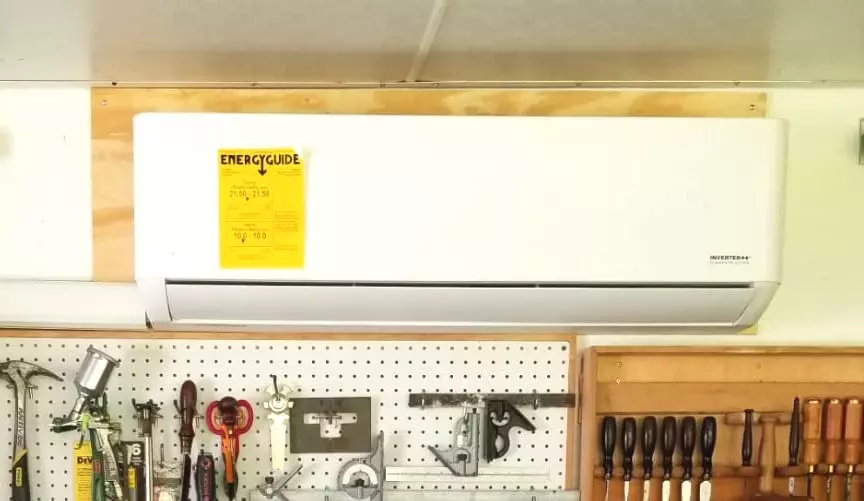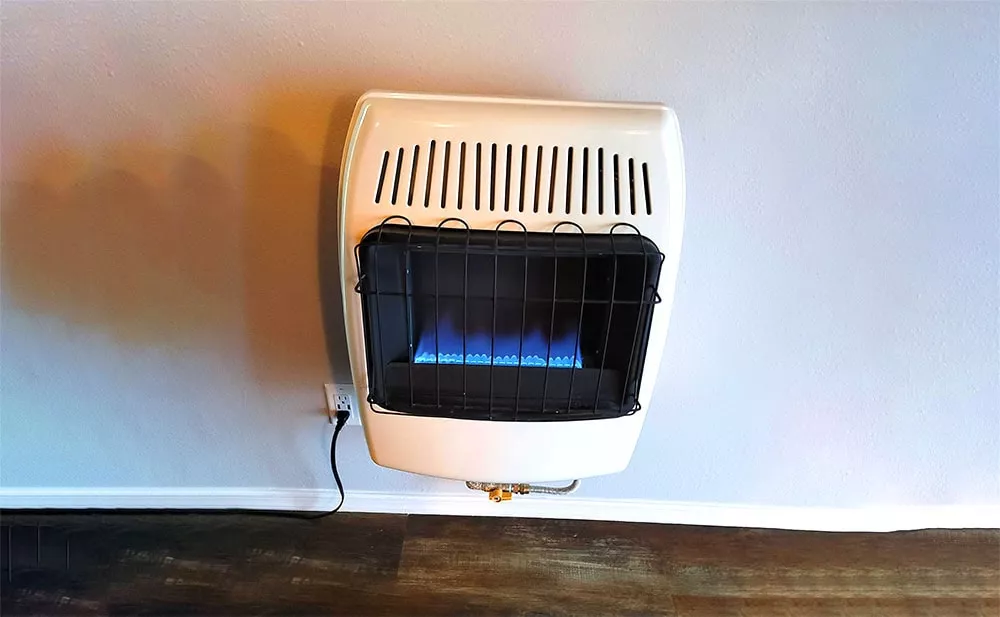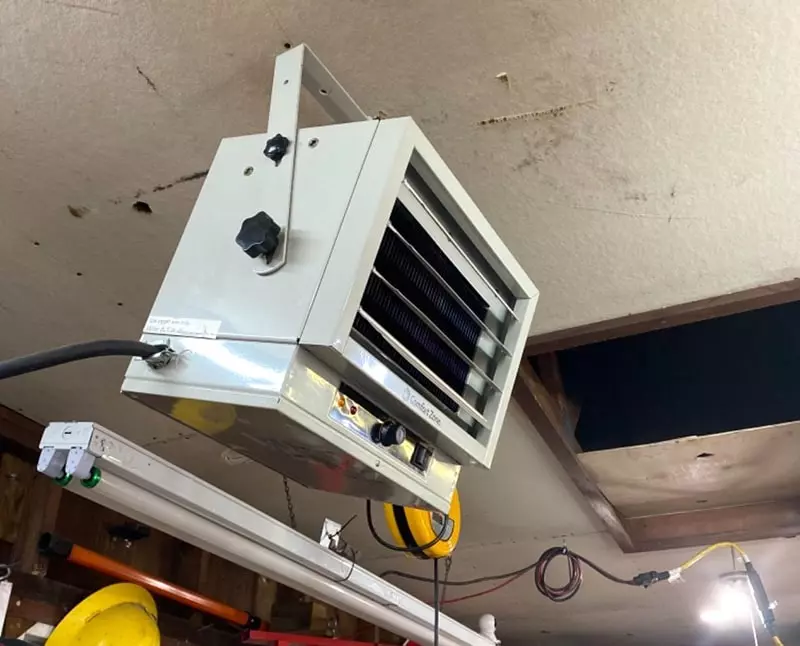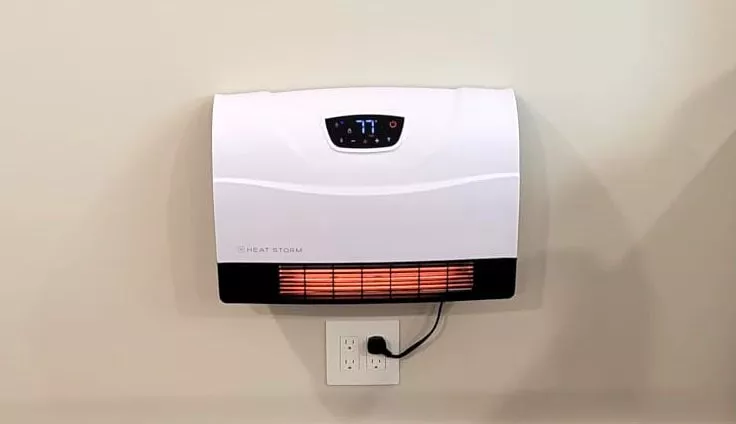Heading into the colder months, we all know the struggle of keeping a basement warm.
Basements, notorious for being the coldest rooms in the house, demand efficient and effective heating solutions to transform them into comfortable living or working spaces.
Whether you require a permanent, powerful solution or a portable, occasional boost of warmth; whether you need a permanent, energy-efficient heater, or a heater with low upfront cost and high heat output, we’ve dissected the features, pros, and cons of the 4 best gas and electric basement heaters.
Best Basement Heaters
1. Pioneer Diamante Ultra Mini-Split Heat Pump (12,000 BTU)
The ideal heater for a basement is a mini-split heat pump. My recommendation is the Pioneer Diamante Ultra (available on amazon).
You should consider it if you’re spending significant amounts of time in your basement.
 A mini-split heat pump is the most energy-efficient heater for a basement. But it requires some installation.
A mini-split heat pump is the most energy-efficient heater for a basement. But it requires some installation.
Key Features:
- 12,000 BTU: Powerful enough to regulate the temperature in a medium-sized basement comfortably.
- Space-Saving: Since it’s wall-mounted, it frees up valuable floor space that other heaters might occupy.
- Installation: While it requires professional installation, once it’s in place, it’s an unobtrusive part of your home.
- Climate Control: Besides heating, it acts as a dehumidifier, maintaining a comfortable humidity level, which is essential in often damp basement environments.
- Energy Efficiency: One of the standout features is its energy efficiency. It provides more heat per unit of electricity than traditional electric heaters, translating into lower running costs.
Pros:
- Dual function as both a heater and an air conditioner.
- Saves floor space due to its wall-mounted design.
- Offers significant energy savings and cost efficiency over time.
- The heat pump technology is known for its quiet operation compared to traditional heating systems.
Cons:
- The initial cost of purchase and installation can be higher than other heating options.
- It requires professional installation, which may not be practical for those looking for a quick, DIY solution.
Best Suited For:
This Mini-Split Heat Pump system is ideally suited for homeowners who use their basements regularly - be it as a home office, gym, or family room - and who are willing to invest in a long-term, cost-effective heating (and cooling) solution.
Energy Considerations:
While the upfront costs are significant, the energy efficiency of a mini-split system is where it truly shines. It can produce more than twice the heat of a regular electric heater while consuming less energy, which will be reflected in your energy bills, particularly if you live in regions with colder climates and extended heating seasons.
2. Dyna-Glo Wall-mounted Propane Heater (30,000 BTU)
The Dyna-Glo Heater (click to view it on amazon) outputs 30,000 BTU of heat energy per hour. It’s the strongest heater in this list and powerful enough to heat any basement without the need for electricity.
It’s an ideal choice for those who may face power outages during winter storms or for those seeking a heating solution with a low initial investment.
 The Dyna-Glo propane heater can heat any basement to any temperature, even without electricity!
The Dyna-Glo propane heater can heat any basement to any temperature, even without electricity!
Key Features:
- 30,000 BTU: A high heat output that can warm a large area, making it efficient for even expansive basements.
- Space-Efficient: Wall-mounted design means no floor space is taken up, maintaining your basement’s usable area.
- Cost-Effective: The running costs are relatively low compared to electric heaters, and the initial purchase price is reasonable.
- Emergency Heating: As it doesn’t rely on electricity, it’s perfect for emergency situations or areas prone to power outages.
- Propane-Powered: Requires regular propane refills, which is a consideration for ongoing maintenance and operation.
Pros:
- Strong heating capability can quickly raise the temperature, even in large basements.
- Completely indoor safe & certified.
- The unit’s design ensures that it doesn’t encroach on your living or storage space.
- Low running costs make it economical over the long term.
- Independence from electrical power makes it reliable in all situations, enhancing its suitability for emergency preparedness.
Cons:
- Requires propane tank refills.
- One product of propane combustion is water vapor. To avoid moisture buildup, you have to ensure proper ventilation.
Best Suited For:
This heater is particularly well-suited for individuals who use their basements occasionally and need a quick, powerful heating source. It’s also ideal for those seeking a backup heating system in case of electricity outages during winter storms.
It’s also suitable for large basements which require more heating power.
Energy Considerations:
Propane is known for its cost-effectiveness as a heat source. The heater’s low running costs can be a significant long-term saving, cutting your heating bill in half (as compared to traditional electric heating).
Although, the need for propane tank refills does add an extra task to your to-do list.
3. Comfort Zone CZ220 (17,000 BTU / 5,000 Watts)
The Comfort Zone CZ220 (click to see it on amazon) is a heavy-duty electric heater that delivers a massive 5,000 watts of heating power. Its ceiling-mounted design ensures that it takes up no valuable floor space, making it an excellent option for those who use their basement for storage or as a functional living space.
Originally, the Comfort Zone CZ220 is a garage & workshop heater, so it’s a very sturdy and industrial-looking heater.
 The Comfort Zone is the strongest electric basement heater in this list. But it requires installation by a professional.
The Comfort Zone is the strongest electric basement heater in this list. But it requires installation by a professional.
Key Features:
- 5,000 Watts: This heater provides exceptional heating power, capable of warming large spaces quickly. That’s equivalent to approx. 17,000 BTU/h.
- Ceiling-Mounted: By being mounted on the ceiling, it saves floor space and distributes heat more evenly throughout the room.
- Hardwired Installation: Designed for a permanent installation into a dedicated circuit in your basement. Ideally, hire a professional to take care of the installation.
- Resistive Heating: This is a resistive heater, not a heat pump, meaning it converts electricity directly into heat without the efficiency of a heat pump.
Pros:
- The heater’s 5,000 watts of power make it over three times as powerful as a regular 1,500-watt electric heater.
- The ceiling-mounted design is ideal for keeping your floors clear and the heat distribution even.
- You have the option to run it on lower settings to save on energy costs if full power isn’t necessary.
Cons:
- The energy costs are high due to the nature of resistive heating - costing about $0.85 per hour at full power based on an electricity rate of 17 cents per kWh ( US average).
- It requires a professional installation, as it needs to be hardwired into your electrical system, which could add to the upfront cost.
- Not suitable for areas where electricity is expensive, as it could become cost-prohibitive to run during colder months.
Best Suited For:
This heater is best for locations where electricity is relatively inexpensive (ideally, lower than average) and for homeowners who are seeking a permanent heating solution in their basements.
Its high heat output makes it suitable for large basements that require a significant amount of heating.
Energy Considerations:
With the cost of operating at full power being approximately $0.85 per hour, this heater is not intended to be run 24/7. Ideally, you use it in short bursts whenever you need more warmth in your basement.
Of course, you can adapt the heat setting and run it on lower power levels to save money.
4. Heat Storm Infrared Heater (5,120 BTU / 1,500 Watts)
The Heat Storm HS-1500-PHX (click to view it on amazon) operates at 1,500 watts, the standard for regular electric heaters, and uses infrared technology to provide warmth.
Infrared heaters immediately heat objects directly in front of them, which in turn, emit convectional heat, which heats up the whole room. So, an infrared heater turns you into a heat source. And they make you feel very warm.
 The Heat Storm infrared heater is the simplest of all basement heaters. Just plug it into the wall outlet, and start heating.
The Heat Storm infrared heater is the simplest of all basement heaters. Just plug it into the wall outlet, and start heating.
Key Features:
- 1,500 Watts: Delivers a gentle heat, suitable for personal use or heating a small area, such as an individual room.
- Wall-Mountable: Can be mounted on the wall to keep the floor space clear, perfect for smaller or crowded rooms.
- Dust-Safe: Comes with filters that capture dust, helping to keep the air clean and reduce the buildup of dust inside the heater; filters are also washable for easy maintenance.
- Infrared Heating: Offers efficient, direct warmth without the need to heat the entire room, making it more energy-efficient in certain scenarios.
Pros:
- Saves floor space due to its wall-mountable design, providing heat without clutter.
- The filters prevent dust buildup inside the heater (which is a frequent problem in electric heaters) and they are washable.
Cons:
- With a 1,500-watt output, it’s not designed for large areas or as a primary heat source for spacey cold basements. It’s
- It is more suitable for spot heating or temporary use rather than consistent, long-term heating.
Best Suited For:
The Heat Storm Infrared Heater is ideal for those in need of temporary heating solutions—such as when hosting guests in the basement - or for targeted warmth in a designated area.
The Heat Storm infrared heater is very quick to set up and requires no installation (except the wall-mount, which is straightforward).
Energy Considerations:
As a 1,500-watt heater, it consumes a lot less energy than other heaters in this list. And because it emits heat as focused infrared rays, the heat feels a lot warmer than it actually is.
Conclusion: What are the Best Basement Heaters?
The best basement heater is the Pioneer Diamante Ultra Mini-Split Heat Pump (12,000 BTU) for those who use their basements regularly and seek an energy-efficient, long-term solution for both heating and cooling.
For a more cost-effective, powerful option without the need for electricity, the Dyna-Glo Wall-mounted Propane Heater (30,000 BTU) is ideal, especially in areas prone to power outages or for those who require strong heating capability.
When choosing a basement heater, consider:
- Mini-split heat pumps: Ideal for regular use, offering both heating and dehumidifying, with higher upfront costs but lower operating expenses.
- Gas heaters: Suitable for large spaces and power outage scenarios, require fuel refills but provide strong, consistent heat.
- Heavy.duty electric heaters: Save floor space and heat evenly, good for areas with lower electricity costs due to higher power usage.
- Infrared heaters: Best for direct, spot heating in smaller areas or when you need quick warmth without heating the whole basement.
Pick a heater that suits your space, usage frequency, and budget while keeping energy costs in mind.